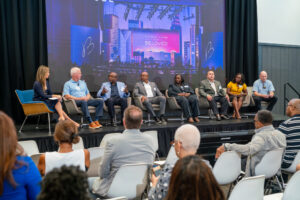The September 19 Transform Westside Summit brought together leading voices from across Atlanta’s philanthropic community as recipients of the 2025 Beloved Benefit presented by the Same House convened for a conversation themed “Building The Same House: Advancing Beloved Community & Economic Mobility in Atlanta.”
The gathering brought together nonprofit leaders, community voices, and institutional partners for a robust conversation about inclusion, belonging and the work of economic justice in Atlanta.
John Ahmann, President & CEO of Westside Future Fund, opened the summit and welcomed the participants, setting the tone for an exchange that would bridge vision and action. The morning devotional was presented by Rodney Bullard, CEO of The Same House, who also spoke about the mission and model of his organization, which seeks to bridge social divides and invest in economic mobility.
After a rousing round of neighbor introductions, the morning’s session was moderated by Amara Walker, an Emmy-award winning communicator. She led a panel discussing community and economic mobility.
The panel featured voices from across sectors, each bringing different vantage points on community, economy, and systems change:
- Bruce Deel, Founder & CEO of City of Refuge, emphasized the role of comprehensive services—housing, mental/physical health, vocational supports—as foundational to breaking cycles of poverty.
- Marlin D. Harris, of New Life Community Alliance, brought a community development and faith-rooted perspective to the table.
- Kwame Johnson, President & CEO of Big Brothers Big Sisters Metro Atlanta, stressed the importance of mentorship, opportunity, and relational capital in economic mobility.
- Dr. Victoria Seals, President of Atlanta Technical College, addressed workforce readiness, credentialing, and alignment between education and opportunity.
- Santiago Marquez, CEO of the Latin American Association, called attention to immigrant communities, language access, housing, and inclusion as essential to a just city.
- Dr. Sarah Y. Vinson, Professor & Chair in Psychiatry & Behavioral Sciences at Morehouse School of Medicine, lifted up the intersections of mental health and community well-being: how trauma, stress, and access to care shape lives.
- John Ahmann, President & CEO of Westside Future Fund, underscored that stable, affordable housing is the foundation for economic mobility, and shared how the Home on the Westside program helps ensure longtime residents can remain in and thrive within their community.
From the conversation, several themes stood out as foundational to advancing the vision of a beloved community:
- Collaboration is the only way forward.
Bruce Deel of City of Refuge stressed that “collaboration is the only way it works. None of us can do everything.” He shared how his organization partners with Atlanta Technical College, Westside Future Fund, and vocational training programs to create pathways to livable wages, which in turn stabilize housing and strengthen community security. - Mentorship transforms potential into opportunity.
Kwame Johnson of Big Brothers Big Sisters of Metro Atlanta described their new Level Up program, which places paid mentors in schools every day: “Attendance is up, discipline is down, suspensions are down. And we’re now teaching 20 cities in our network how to do it.” His story underscored that mentorship at scale can break cycles of poverty by ensuring every student has daily access to guidance and support. - Education is a powerful engine of economic mobility.
Dr. Victoria Seals of Atlanta Technical College highlighted how dual enrollment and technical programs can transform households: “More than 20% of our students come from households of less than $25,000. They can do one program with us and are able to earn $60,000.” She emphasized that collaboration allows limited resources to go further and create generational change. - Health and education are inseparable.
Dr. Sarah Vinson of Morehouse School of Medicine noted that schools are central to youth well-being: “We talk about social determinants of health, but there are social and psychological determinants of educational achievement.” She explained that mental health services in schools are critical to helping young people realize their potential. - Building bridges across communities creates strength.
Santiago Marquez of the Latin American Association reflected on collaboration with African-American leaders and lessons from nonviolent movements: “We need to learn from the African-American community … how do we build those bridges and actually learn about nonviolent protest that can help change the world?” His remarks illustrated the power of cross-community learning and solidarity. - Leadership rooted in listening inspires lasting change.
Panelists praised leaders like Rodney Bullard, Dan Cathy, and Arthur Blank for their example. As Bruce Deel recalled, “Dan didn’t come in saying you need to do A, B, and C. He came in asking questions … let the community talk to us versus us talking down.” Their authenticity and humility have modeled how business and civic leaders can empower communities.
John Ahmann closed the summit by affirming WFF’s commitment to the path ahead and inviting continued collaboration. This monthly summit was an anchor point—one moment in ongoing dialogue and action.
If you missed the live session or want to revisit the discussion, you can watch the full summit recording below!
Don’t forget to mark your calendar: the Transform Westside Summits continue monthly, gathering leaders and community voices to envision and build a Westside shaped by equity, inclusion, and economic possibility.

